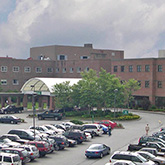Our American College of Radiology accredited Magnetic Resonance Imaging (MRI) program is committed to providing the highest quality imaging and patient care.
Magnetic Resonance Imaging (MRI) is a non invasive test that helps to diagnose and treat medical conditions. MRI produces cross sectional pictures of the body.
MRI uses a powerful magnetic field, radio frequency pulses and a computer to produce detailed images of organs, soft tissues, bones and other internal body structures.
Typical uses for MRI Imaging:
- Brain and Spine
- Vascular System (imaging blood vessels)
- Musculoskeletal system (imaging of bones, muscles, tendons, ligaments, joints, cartilage and other connective tissue)
Safety
MRI contains no ionizing radiation. There have been no documented significant side effects of the magnetic fields and radio waves used on the human body.
The MRI technologists are committed to providing quality patient care. They strive to obtain adequate diagnostic images for both the radiologists and physicians. This ensures that you will receive optimal healthcare at Central Vermont Medical Center.
Patients with cardiac pacemakers cannot have an MRI and should not enter MRI area.
You may not be able to have an MRI if you have any of the following:
- Brian aneurysm clips
- Certain artificial heart valves
- Cochlear implants
- Recently placed artificial joints
- Older types of vascular stents
- Surgery in the past 6-8 weeks using ferrous metal clips
In addition, the following conditions need to be considered:
- If you have claustrophobia (fear of enclosed spaces) or anxiety, you may want to ask your physician for a prescription for a mild sedative prior to the examination. If you take an oral mild sedative prior to the MRI, you will need someone to drive you home.
- Patients that may have been exposed to small metal fragments in the eyes should receive facial x-rays prior to MRI examination.
- Some MRI procedures require the use of contrast (dye). This is injected through a small catheter needle. The most common type of contrast used is gadolinium. Allergic reactions to the substance rarely occur.
Preparing for Your MRI
Food and Drink
Depending on the area being imaged, you may be asked not to eat or drink anything for 4-6 hours prior to the exam.
Personal Items
Patients are welcome to bring in their own iPods (headphones will be provided).
Metallic Objects
Metallic objects need to be removed from the patient prior to an MRI exam. Metal containing objects may move freely within the scan room. This is very dangerous, so they are prohibited from the scan room.
What to Expect During Your MRI
The MRI unit is a large, cylinder-shaped tube surrounded by a circular magnet. You will lie on the patient table and the body part being imaged will be centered in the magnet. Some examinations require the additional use of a coil to help improve image quality. The coil may surround the body part being imaged.
You are required to lie still for approximately 45 minutes. Subtle movements can blur the MRI images making a diagnosis by the radiologist more difficult. The technologist will talk to you throughout the examination by use of an intercom system that allows you to speak to the technologist as well.
The machine produces loud thumping noises. You will be provided with ear protection during the exam to reduce the noise.
After Your MRI
If you take an oral mild sedative prior to the MRI, you will need someone to drive you home.
You may resume your normal diet, activity and medications.
A radiologist will read your MRI exam. Physicians/Ordering Providers will have access to examination results within 48 hours. Your physician will be in touch with you.
VRad: Teletechnology Service for Emergent MRI Scans
CVMC utilizes a tele-radiology service for emergent MRI scans when a radiologist is not on site at the hospital. We upload the digital images of the MRI scan to a tele-radiology service, who then assigns the exam to a radiologist that is certified in that particular imaging modality. VRad is a U.S.-based company employing only ACR (American College of Radiology) certified radiologists. Final reports are normally received in one hour or less at transmitting time.
Outpatient MRI examinations are read by board certified Radiologists. A written report will be mailed to the ordering physician within 48 hours of completed exam.
Accreditation
 Central Vermont Medical Center receives Magnetic Resonance Imaging (MRI) Accreditation Approval
Central Vermont Medical Center receives Magnetic Resonance Imaging (MRI) Accreditation Approval
The American College of Radiology’s Committee on MRI Accreditation has GRANTED ACCREDITATION to CVMC's Magnetic Resonance Imaging (MRI) unit through September 2021. Accreditation is granted to facilities that have met all of the testing criteria established by the ACR Committee on MRI Accreditation for 1) clinical image quality and 2) phantom image quality.

CVMC Radiology
Hours
Appointments can be scheduled Monday to Friday, with early morning and evening appointments available.
Staffed 7 days a week, 24 hours a day.

